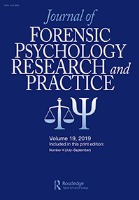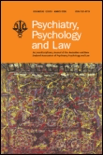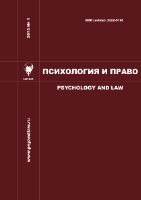
LEGAL AND CRIMINOLOGICAL PSYCHOLOGY
Scope & Guideline
Illuminating the Psychological Aspects of Criminal Justice.
Introduction
Aims and Scopes
- Investigative Interviewing Techniques:
Research focuses on the methodologies and effectiveness of various interviewing techniques used in legal settings, particularly with vulnerable populations such as children and adolescents. - Recidivism and Rehabilitation:
The journal investigates factors influencing recidivism rates among juvenile and adult offenders, emphasizing the role of psychological traits, social dynamics, and rehabilitation practices. - Psychological Assessment in Legal Contexts:
Studies evaluate how psychological assessments influence legal decisions, including the validity of tools used for risk assessment and their implications for sentencing and rehabilitation. - Impact of Childhood Experiences on Adult Behavior:
Research examines how adverse childhood experiences and family dynamics affect later criminal behavior and psychological outcomes. - Criminal Justice System Perceptions:
The journal explores public attitudes toward the penal system, including perceptions of justice, procedural fairness, and the impact of race and ethnicity on legal outcomes. - Cognitive Bias in Legal Contexts:
Investigations into cognitive biases that affect decision-making processes in legal settings, including biases in police interviews and judicial decision-making. - Cybercrime and Technology:
Emerging research focuses on the psychological aspects of cybercrime, including the motivations behind online offenses and the effects of technology on criminal behavior.
Trending and Emerging
- Child and Adolescent Psychology in Legal Contexts:
There is a growing emphasis on understanding the psychological needs and vulnerabilities of children and adolescents within the legal system, particularly in investigative interviews and their long-term implications. - Cognitive Load and Memory in Legal Settings:
Emerging research explores the role of cognitive load on memory recall and decision-making processes during investigative interviews, highlighting the importance of psychological factors in legal contexts. - Online Behavior and Cyberbullying:
In response to the rise of digital communication, there is an increasing focus on understanding the psychological dynamics of cyberbullying, online radicalization, and the impact of technology on criminal behavior. - Direct Replication and Methodological Rigor:
A trend towards methodological transparency and the importance of direct replication studies in legal psychology is evident, as researchers seek to validate findings and strengthen the empirical foundation of the field. - Mental Health and Wrongful Convictions:
Research addressing the mental health implications for individuals who are wrongfully convicted or accused is gaining traction, reflecting a broader societal concern about justice and psychological well-being. - Impact of Social Connections on Criminal Behavior:
Studies are increasingly exploring the role of social connections and community factors in shaping criminal behavior and recidivism, moving beyond individual traits to consider broader social contexts.
Declining or Waning
- Traditional Psychological Theories of Crime:
Research that heavily relies on classical psychological theories, such as general personality traits, appears to be waning, as newer studies adopt a more interdisciplinary approach incorporating sociology and cultural perspectives. - Focus on Adult Criminal Behavior Alone:
There is a noticeable decrease in studies exclusively focused on adult criminal behavior, with a shift towards understanding juvenile offenders and the impact of early life experiences. - One-dimensional Approaches to Victimology:
Research that examines victimology from a purely legal perspective without considering psychological or sociocultural factors seems to be less prevalent, indicating a broader, more integrated approach in recent studies. - Generalized Interrogation Techniques:
The application of generalized interrogation techniques without specific adaptations to different contexts or populations is becoming less common, as the field recognizes the need for tailored approaches.
Similar Journals

Champ Penal-Penal Field
Empowering researchers and practitioners alike.Champ Penal-Penal Field is a premier academic journal dedicated to the interdisciplinary discourse surrounding penal law and its implications in modern society. Published by the Associé Champ Penal-Penal Field, this journal, with ISSN 1777-5272, aims to bridge theoretical and practical aspects of penal studies, fostering a deeper understanding of legal frameworks and their societal impacts. Although it operates under a traditional access model, the journal is committed to providing high-quality research that contributes to the legal field and informs both practitioners and policymakers. Its editorial board comprises esteemed experts who advocate for rigorous analysis and innovative perspectives. The journal plays a vital role in advancing knowledge and dialogue, making it an invaluable resource for researchers, professionals, and students engaged in the complex landscape of penal law.

International Journal of Cyber Criminology
Exploring the intersection of technology and criminal behavior.International Journal of Cyber Criminology is a premier open-access journal dedicated to advancing the field of cyber criminology, publishing cutting-edge research that addresses the intricate relationship between technology and crime. Established in 2007 and published under the esteemed guidance of K Jaishankar, this journal serves as a fundamental resource for researchers, professionals, and students engaged in the study of cybercrime, online security, and digital justice. With an impressive ranking in the Q2 quartile in Law and a notable 81st percentile in Scopus Ranks, it reflects its commitment to high-quality scholarship and impact within the academic community. The journal aims to foster interdisciplinary dialogue and innovative solutions to contemporary cybercrime challenges while supporting free access to knowledge. Hailing from Manonmaniam Sundaranar University in Tamil Nadu, India, the International Journal of Cyber Criminology exemplifies a global perspective on issues affecting society in the digital age, making it an essential publication for those seeking to understand and combat cyber threats.

Journal of Forensic Psychology Research and Practice
Exploring the Intersection of Psychology and Justice.Journal of Forensic Psychology Research and Practice is a distinguished publication within the fields of Applied Psychology and Pathology and Forensic Medicine, published by Routledge Journals, Taylor & Francis Ltd. With a commitment to advancing knowledge from 2017 to 2024, this journal aims to bridge theory and practice by showcasing empirical research, including case studies and innovative methodologies, that address the complexities of forensic psychology in contemporary settings. While it holds a respectable Q3 ranking in both Applied Psychology and Pathology and Forensic Medicine, making it a vital resource for scholars and practitioners alike, its insights contribute significantly to understanding the psychological aspects of criminal behavior and legal processes. Researchers, professionals, and students are encouraged to engage with its content to further their understanding and application of forensic psychology principles in real-world scenarios.

Vox Juris
Unleashing the potential of legal research and scholarship.Vox Juris is a premier academic journal dedicated to the field of legal studies, published by the esteemed Universidad San Martin de Porres, Fondo Editorial. Since its transition to Open Access in 2015, it has significantly enhanced the dissemination of high-quality legal research and scholarship, providing unrestricted access to a wide audience of researchers, professionals, and students globally. Although the journal's H-index and specific scope are currently unspecified, it actively contributes to the discourse surrounding various facets of law, including theory, applications, and interdisciplinary perspectives. Located in the heart of Peru at SEDE LIMA JR LAS CALANDRIAS N0 151291 SANTA ANITA, Vox Juris serves as a vital resource for those seeking to explore and advance their understanding of contemporary legal issues. Its commitment to promoting scholarly dialogue makes it an indispensable platform for both emerging and established voices in the legal community.

Psychiatry Psychology and Law
Connecting Psychological Insights with Legal FrameworksPsychiatry Psychology and Law is a prestigious journal dedicated to advancing the understanding of the interconnections among mental health, psychological conditions, and legal contexts. Published by Routledge Journals, Taylor & Francis Ltd, this journal plays a pivotal role in the field, evidenced by its impressive Q1 ranking in Law and notable positions in multiple disciplines such as Psychiatry and Forensic Medicine. With a commitment to disseminating high-quality research, it has established itself as an essential resource for researchers, professionals, and students in psychology and legal studies. While currently not offering Open Access options, the journal thrives on rigorous peer review processes that ensure only the most impactful studies from its inception in 1994 to the present are published. Covering a diverse range of topics, Psychiatry Psychology and Law fosters interdisciplinary dialogue and innovation, making it a vital platform for advancing scholarly discourse in the critical intersection of mental health and law.

Revista Brasileira de Direito Processual Penal
Championing Open Access in Legal ResearchRevista Brasileira de Direito Processual Penal, published by the Instituto Brasileiro de Direito Processual Penal (IBRASPP), serves as a vital open-access platform for scholars and practitioners in the fields of criminal procedure law and social sciences. With an ISSN of 2359-3881 and an E-ISSN of 2525-510X, the journal has been committed to disseminating innovative legal research since its opening access in 2015, thus fostering engagement within legal academia. Based in Brazil and reaching an array of international contributors, it has achieved a respectable Q2 ranking in both Anthropology and Law categories as of 2023, appealing to a diverse audience interested in legal studies, sociology, and the interplay with mental health issues. The journal's ongoing commitment to excellence and impactful scholarship is reflected in its competitive standing across multiple Scopus ranks, making it a significant resource for researchers, legal professionals, and students looking to deepen their understanding of procedural law and its implications in contemporary society.

American Journal of Criminal Justice
Illuminating Critical Perspectives in Law and JusticeAmerican Journal of Criminal Justice is an esteemed publication within the realm of law and criminal justice, recognized for its significant contributions to the understanding and advancement of this vital field. Published by Springer, the journal has established itself as a leading platform for rigorous academic research and scholarly discourse since its inception in 1975. With its impressive 2023 Q1 ranking in the Law category and its 98th percentile ranking in Scopus among social sciences, the journal showcases cutting-edge research that addresses pivotal issues in criminal justice. Though it does not offer open access, its wealth of content is accessible to academic institutions and professionals seeking to deepen their knowledge. The journal aims to foster interdisciplinary collaboration and to provide a forum for innovative methodologies, policy evaluations, and theoretical perspectives, making it a critical resource for researchers, practitioners, and students dedicated to the evolution of criminal justice.

INTERNATIONAL JOURNAL OF OFFENDER THERAPY AND COMPARATIVE CRIMINOLOGY
Exploring the intersection of criminology and psychology.INTERNATIONAL JOURNAL OF OFFENDER THERAPY AND COMPARATIVE CRIMINOLOGY, published by SAGE PUBLICATIONS INC, is a leading journal in the fields of criminology, psychology, and forensic medicine, with a robust legacy dating back to 1966. With ISSN 0306-624X and E-ISSN 1552-6933, this journal presents innovative research and theoretical discussions that seek to improve offender rehabilitation and comparative criminological studies. The journal’s high-impact contributions have garnered it a prestigious Q1 ranking in Arts and Humanities and a Q2 ranking in Pathology and Forensic Medicine as of 2023, making it a valuable resource for scholars and practitioners alike. Researchers will find the journal's commitment to advancing knowledge through empirical evidence and critical analysis particularly compelling, as it addresses contemporary challenges in offender therapy. Though not an Open Access journal, its diverse scope ensures that readers have access to pivotal insights that drive progress and inform policy in justice and rehabilitation systems. With a focus on interdisciplinary approaches, the journal serves as an essential platform for academics, professionals, and students aiming to deepen their understanding of comparative criminology and its applications.

Psychology and Law
Enhancing legal frameworks through psychological perspectives.Psychology and Law, published by Moscow State Psychological & Pedagogical University, is an open-access journal dedicated to advancing knowledge at the intersection of psychology and legal studies. Since its establishment in 2011, the journal has provided a platform for high-quality research that addresses critical issues in applied, clinical, experimental, cognitive, and social psychology. Despite ranking in the Q4 quartile for various psychology categories in 2023, this journal remains committed to fostering insightful discussions and contributions to the field. Researchers and practitioners from diverse backgrounds are encouraged to explore its accessible content, which aims to enhance our understanding of psychological principles within legal contexts. The journal's ISSN is 2222-5196, and it primarily serves an international audience, promoting scholarly engagement and interdisciplinary collaboration. As the field evolves, Psychology and Law continues to be a vital resource for those seeking to bridge the gap between psychological research and legal practice.

PSYCHOLOGY CRIME & LAW
Innovating Research at the Crossroads of Crime and PsychologyPSYCHOLOGY CRIME & LAW, published by Routledge Journals, Taylor & Francis Ltd, is a premier academic journal dedicated to the intersection of psychology, criminology, and the law. With an ISSN of 1068-316X and an E-ISSN of 1477-2744, this journal provides a critical platform for the dissemination of cutting-edge research and innovative methodologies in the fields of psychology, forensic medicine, and legal studies. Spanning over three decades (1994 to 2024), it holds impressive Scopus rankings, placing it in Q1 and Q2 quartiles for its contributions to law and forensic medicine, highlighting its standing within the academic community. PSYCHOLOGY CRIME & LAW is particularly noted for addressing contemporary issues at the crossroads of human behavior and legal standards, making it essential reading for scholars, practitioners, and students alike. While the journal is not open access, it offers valuable insights into a variety of topics, from criminal psychology to the implications of mental health in legal contexts, ensuring that it remains an influential resource for those engaged in research and professional practice.